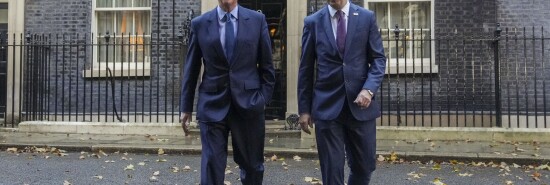
Why pro-China David Cameron is the UK’s new foreign secretary
Tom Rogan
Video Embed
In a shocking development, British Prime Minister Rishi Sunak appointed David Cameron as the nation’s foreign minister (the equivalent position to the U.S. secretary of state) on Monday.
A fellow member of the Conservative Party, Cameron served as the United Kingdom’s prime minister between 2010 and 2016. He resigned from that top job after the Brexit referendum vote to leave the European Union (Cameron had campaigned for the U.K. to remain in the EU). But in a highly unusual development in the modern political era, Cameron will serve as foreign secretary, even though he isn’t an elected member of Parliament. Instead, Cameron has been appointed to the unelected House of Lords to enable him to assume his new post. I see three major reasons why Cameron is back.
REPUBLICANS NAVIGATE CULTURE WAR SETBACK ON ABORTION
First up, there are the domestic politics. Alongside other ministerial shuffles on Monday, the big-name dismissal was that of Suella Braverman as home secretary (the minister responsible for counterterrorism, immigration, and policing). Popular on the Conservative Party’s right for her anti-immigration efforts, Braverman had courted controversy in recent days. After rebuking London’s police commissioner for allowing pro-Palestinian protests this weekend, she was seen as having undermined government policy and effective governance. Braverman’s position was further undermined when the majority of the disorder during the weekend protests was caused not by pro-Palestinian marchers, but rather by counterprotesting soccer hooligans. James Cleverly, meanwhile, is leaving as foreign secretary to replace Braverman as home secretary.
Sunak is hoping Cameron’s return will limit the media and Labour Party opposition’s criticism over the Braverman controversy. This matters because the U.K. will hold parliamentary elections by the end of January 2025 (the government decides when to call elections). The Labour Party is leading heavily in opinion polls, and Sunak wants to minimize negative distractions. Evincing Sunak’s growing focus on election strategy, the government is preparing new welfare cuts designed to appeal to Conservative and independent voters.
Next up, there’s the China factor. As with Sunak and Cleverly’s stance on China, Cameron prioritizes trade with China over security concerns such as Beijing’s espionage and threats to Taiwan. As prime minister, Cameron declared a “golden era” of U.K.-China relations. And since leaving office, Cameron has engaged heavily with Chinese Communist Party-linked interests such as the U.K.-China Fund and the Belt and Road Initiative. With Cameron’s arrival, Cleverly as home secretary, and the recent departure of defense secretary Ben Wallace, the top ranks of the U.K. government are now firmly ensconced in the China appeasement camp. Sunak knows Beijing likes Cameron. He’ll hope it will be inclined to deal kindly with him. This will obviously concern the United States as it attempts to build allied support on China concerns.
One final point: Sunak knows that Cameron’s prior experience affords him knowledge of the U.K.’s intelligence services. That’s relevant because the foreign secretary is responsible for overseeing the U.K.’s SIS/MI6 foreign human intelligence service and its GCHQ signals intelligence service. Considering some of the highly sensitive intelligence efforts these services are engaged in, Sunak is hoping Cameron can avoid potentially catastrophic intelligence-related leaks or errors. China is again a preeminent concern here, both for reasons of U.K. intelligence activity and because Sunak, Cleverly, and Cameron are viewed by many in the U.K. intelligence community as too appeasement-minded toward Beijing.
Top line: Expect a lot of U.S. Embassy-London cables with titles including the words “Lord Cameron.”
